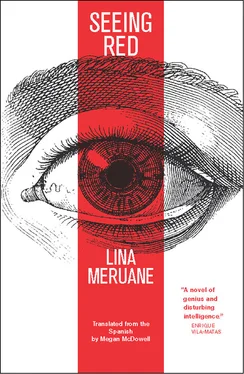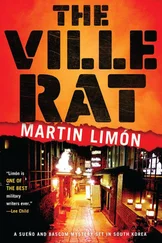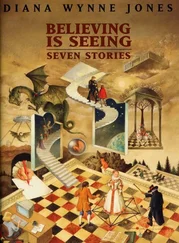Lina Meruane - Seeing Red
Здесь есть возможность читать онлайн «Lina Meruane - Seeing Red» весь текст электронной книги совершенно бесплатно (целиком полную версию без сокращений). В некоторых случаях можно слушать аудио, скачать через торрент в формате fb2 и присутствует краткое содержание. Год выпуска: 2016, Издательство: Deep Vellum Publishing, Жанр: Современная проза, на английском языке. Описание произведения, (предисловие) а так же отзывы посетителей доступны на портале библиотеки ЛибКат.
- Название:Seeing Red
- Автор:
- Издательство:Deep Vellum Publishing
- Жанр:
- Год:2016
- ISBN:нет данных
- Рейтинг книги:3 / 5. Голосов: 1
-
Избранное:Добавить в избранное
- Отзывы:
-
Ваша оценка:
- 60
- 1
- 2
- 3
- 4
- 5
Seeing Red: краткое содержание, описание и аннотация
Предлагаем к чтению аннотацию, описание, краткое содержание или предисловие (зависит от того, что написал сам автор книги «Seeing Red»). Если вы не нашли необходимую информацию о книге — напишите в комментариях, мы постараемся отыскать её.
This powerful, profound autobiographical novel describes a young Chilean writer recently relocated to New York for doctoral work who suffers a stroke, leaving her blind and increasingly dependent on those closest to her. Fiction and autobiography intertwine in an intense, visceral, and caustic novel about the relation between the body, illness, science, and human relationships.
Lina Meruane
Seeing Red — читать онлайн бесплатно полную книгу (весь текст) целиком
Ниже представлен текст книги, разбитый по страницам. Система сохранения места последней прочитанной страницы, позволяет с удобством читать онлайн бесплатно книгу «Seeing Red», без необходимости каждый раз заново искать на чём Вы остановились. Поставьте закладку, и сможете в любой момент перейти на страницу, на которой закончили чтение.
Интервал:
Закладка:
iron hand
She threw herself on my neck. A medusa, a jellyfish, an ocean flagellum, a gelatinous organism with tentacles that would cause a rash. There was no pulling my mother off of me. Her body contracted as if she were sobbing and she gave off a substance one hundred percent lethal. That poisoning by maternal venom would have brought on a dizzy spell, would have made me fall over in a faint. But no, there were no fainting fits or swoons. No ether or hysterical outbursts. Just a little ink to give some contrast to an opaque scene: my mother waiting for me atop her high-heeled shoes in the doorway, tapping her heels on the pebbles. She’d gotten up at dawn, worked erratically during the very first hours of the morning so later on she could leave the last acute patients to a troop of aspiring pediatric internists. And carrying the smell of the hospital, the smell of children vomiting the pus of their lungs all over her, my mother had returned home. Running red lights. Cruising over crosswalks and speed bumps without slowing down. And now she was outside, clutching the gate, letting the rain drench her. It would have been a perfect reencounter with rain falling on us. Falling in buckets. Pouring down. Driving us into the ground. But had it been raining I would have remembered the drumming sound on the Dodge’s roof, I’d remember a downpour just like I remember the cutting cold of that winter. It wasn’t raining, wasn’t drizzling, there wasn’t even a miserable, murderous hail falling. Only the snow clouds emptying over the peaks of some faraway mountains. Only a wind peeling the trees, ruffling the leaves and swirling them in eddies. Fighting that gust of impertinent air, my mother would be tending her hair, fresh from the hairdresser’s hands; she’d be fluffing her mane upwards while her husband, whom she’d insisted on calling her “old man” ever since they were young, parked the car on the gravel. And maybe my mother was still smoothing a lock stiff with hairspray, nodding slightly at her own thoughts. Maybe she adjusted her glasses on her nose, maybe she stuck the tip of a painted nail in her mouth when she saw me get out of the car like a bride in black. A bride in mourning on my father’s arm. In another invented memory, some fingers appear and energetically separate me from the old man, my mother’s old man, though now she too is almost elderly. It’s her arm, her hand, and my mother’s invincible muscles that want to guide me, no limping or slipping, toward the door; she wants to save me from treacherous stairs, guide me across thresholds that lead nowhere, protect me from banging into bookcases. From obstacles crouching in corners. From the TV antenna that could pierce my eyes. The burner on the stove, the boil of the pots, the roar of the kettle. My mother tugs me along because the entire house is armed against me. She squeezes me with an iron fist, sticking her nails in through my sweater until she buries them in my flesh. Scratches. Deep cuts. Wounds that don’t scar over: I’m gushing blood. I plead for help, but from whom? My older brother is meeting with some Mexican or maybe Colombian clients and he can’t come to the phone. He sends a message through his secretary, who must be a sublime girl in high heels and a low-cut blouse, but who could just as well be a stuffy old lady with the voice of a young woman. Whichever it is, she tells me that señor Joaquín will call as soon as he’s free. Tell him I’m in Santiago being devoured by a delicate carnivorous flower. But the woman hangs up before I say anything. Through the phone I only hear the continuous, irritating sound of a machine that records, monotonous, my cardiac arrest as it’s happening. Better this way, I think. My big brother has his own issues, his own humor, biting, too black to hear my call for help. I turn, then, to my younger brother, another aloof wunderkind who in two curt words lets me know he’s on his way, that he’s almost here, that he’s here. He honks his horn before coming in and sitting down to lunch. A sticky kiss falls on my cheek. Hey, sis, he says in English, casually. An old habit picked up in New Jersey. How was the flight, sis, could you sleep at all? He sits down at the table, stuffs a piece of bread in his mouth, and, still chewing, mutters a mom, you could let up just a little, couldn’t you? Luci can’t eat when she’s in shackles. I can call to mind those enormous black eyes of my brother’s, his deep voice and his coal-black eyes. My mother, who forgot about smiling months ago, lets out a maniacal peal of laughter and lets go of me. My father, not realizing what is happening or maybe acting the crazy a bit himself, lets his big hand fall on top of mine and handcuffs me with his fingers. And my brother, chewing something that from its crunch must be a carrot or celery stick, says, slowly, but you’re not totally blind, or are you? I hear gasps around the tablecloth and the strident music of a fork falling onto a plate, then Olga’s discreet entrance with another dish and her immediate exit backstage, not daring to interrupt and say hello to me. And unaware a brawl is about to break out full swing, my brother Félix asks, completely calm — his amputated nerves are inherited from my father — another forbidden question. Where am I going to have the operation, in the end? What do you mean where? I ask him, raising my voice but holding back. There’s never been any doubt about where. We’ll talk about this later, my mother intercedes, giving me a kick under the table that was meant for someone else. There’s nothing to discuss, I start to tell them, pushing away the plate of oily spaghetti that in any case I couldn’t bring myself to eat, and knocking over a glass of red wine. I’m not going to see that doctor, I tell them, sensing a flurry of napkins falling over the table. Don’t you remember what happened the last time I went? Hands mop up the wine; Olga reappears, lifting up my plate and wiping underneath it. And I manage to catch her and I ask her to sit down, because she is part of our life though my parents refuse to accept it, because I need her as my ally, because even if she’s against me she should be part of this conversation and not turning a deaf ear behind the door. I’m not going to see him, much less be operated on by that specialist who looks down on all his patients, I don’t care if he’s Harvard-trained or a disciple of Barraquer. My post-Soviet doctor is better, he takes the time to explain my eyes to me and he doesn’t jump to the knife like that aggressive Chilean eminence with a diploma that’s gringo anyway. Someone picks up my glass, but it isn’t Olga. Someone lets out a sigh of frustration, and I suspect it is my mother. Cancel the appointment, I insist. Because I won’t go, not even if you tie me up. Not even drugged. You all hear me? Not even dead.
holes
If you’re not exhausted, said Félix as he came tiptoeing into my room, if you’re not absolutely worn out, come take a drive with me. Downtown, he said. I have a new project I want to show you. Show me? Tell you about, he replied, editing himself, adding, let’s go for a ride! You feel like it? Do I feel like it? I yanked off my headphones, leaving half-finished the chapter of another novel I’d already read. I turned off the device and threw it onto the bed. I would have headed out into the street and crossed through blaring horns without looking, I would have forced the locks to get into any random car, I would have pressed my own foot to the accelerator just to get out of that house. I needed fresh air, even if Santiago’s was radioactive. Now we can talk about the important things, said my brother as he fastened his seatbelt and constrained my body with the passenger side belt. As the car set off and began to gather speed, I looked into the rearview mirror with my mind’s eye, the eye that later conceives memories. Félix checked behind him; my eyes were staring blankly forward. Right away Félix began talking to me about the tower he was involved in, involved up to his eyebrows, he said, with his team. But why build more towers? I thought. Towers are monuments in decline, you only have to build them and someone comes and knocks them down. But my brother unspooled his soliloquy with the modular details of the design, the widths and lengths of each floor, every one of the windows; he threw out names of materials, angles of incline, resistance calculations. He talked, absorbed in the downtown’s architectural renovation, the urgent need to make room for the new, the empty lot’s biography. I listened to him silently, thinking how at that insipid afternoon hour we would be surrounded by full buses, full taxis, maybe an empty cart coming from the central market, how we’d be traveling with an escort of shining and insolent cars destined to leave us behind. I thought about and almost saw the muddy and hostile river that Ignacio would come to feel was his, as with everything, as with too much. I struggled to listen to what my brother was saying, so young and euphoric, so indifferent. I let loose pieces of the city sprinkle over the map in my visual memory, Santiago’s dirty avenues and the contours of its corners, handwritten signs with grammatical mistakes, shops selling used American clothes, the dubious cafes con piernas in the city center, certain streets that every Chilean knows and that I was going to introduce Ignacio to later, broken phone booths, carts selling cups of cold mote con huesillo. To your left is Plaza Italia (and the plaza appeared to me, Ignacio, the one that’s now recorded by your eyes, the plaza with its Icarus carrying an excessive bronze torch), and to the right, he said, the refurbished, or rather, converted ex-Normandie, (the cinema where I watched midnight screenings of devastating Russian films, killing myself with cold, dying of fatigue), and here, Félix’s voice interrupted my memories, here is Santa Lucia hill and its mural of the founding of Santiago (each word a spadeful of color in my head), you know where we are? I simply nodded before the panoramic format of my Santiago past as it went through my head. The car shot through the city like a meteor until we reached La Moneda palace, which appeared to me white, immaculate, the way it was before military helicopters flying overhead dropped bombs on it, and in the midst of the imagined offensive, with the soundtrack of the dictator’s voice announcing his ignominious victory in the background, the live, guttural, articulate voice of my brother Félix slipped in, chronicling the square meters his tower would have, his invisible team’s tower, once it was complete. Félix, I said, interrupting him: where are the holes? In La Moneda? What are you talking about, he answered impatiently. They rebuilt it ages ago! But I was talking about the buildings across Alameda, on Paseo Bulnes, the old buildings with walls colored by time and dust, perforated especially on the highest floors by devastating bazooka fire. Oh, yes, he said, those are still there, the gaping holes, and also in the less visible buildings on nearby streets you can see the holes from the machine guns fired by sharpshooters posted on neighboring roofs. Why do you ask? I’m not sure, I heard myself answer. And I also told him that I was thinking about the shards of the coup, so many acid shards eating away at the concrete. And I also thought, but didn’t say, that those walls had witnessed everything, but were now blindfolded by a thick layer of soot that only fell away, a little every few years, in the earthquakes.
Читать дальшеИнтервал:
Закладка:
Похожие книги на «Seeing Red»
Представляем Вашему вниманию похожие книги на «Seeing Red» списком для выбора. Мы отобрали схожую по названию и смыслу литературу в надежде предоставить читателям больше вариантов отыскать новые, интересные, ещё непрочитанные произведения.
Обсуждение, отзывы о книге «Seeing Red» и просто собственные мнения читателей. Оставьте ваши комментарии, напишите, что Вы думаете о произведении, его смысле или главных героях. Укажите что конкретно понравилось, а что нет, и почему Вы так считаете.












